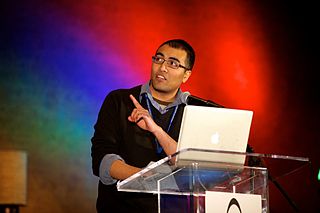Related Research Articles
A creed, also known as a confession of faith, a symbol, or a statement of faith, is a statement of the shared beliefs of a community in a form which is structured by subjects which summarize its core tenets.
Faith, derived from Latin fides and Old French feid, is confidence or trust in a person, thing, or concept. In the context of religion, one can define faith as "belief in God or in the doctrines or teachings of religion". Religious people often think of faith as confidence based on a perceived degree of warrant, or evidence while others who are more skeptical of religion tend to think of faith as simply belief without evidence.

The religious affiliations of presidents of the United States can affect their electability, shape their stances on policy matters and their visions of society and also how they want to lead it. Speculation of Thomas Jefferson, Abraham Lincoln, and William Howard Taft being atheists was reported during election campaigns, while others, such as Jimmy Carter, used faith as a defining aspect of their campaigns and tenure to hold the office.

Secular humanism, often simply called humanism, is a philosophy, belief system or life stance that embraces human reason, secular ethics, and philosophical naturalism while specifically rejecting religious dogma, supernaturalism, and superstition as the basis of morality and decision making.

Religious Humanism is an integration of non-theistic humanist ethical philosophy with congregational rites and community activity which center on human needs, interests, and abilities. Self-described religious humanists differ from secular humanists mainly in that they regard the non-theistic humanist life stance as their religion while organizing with a congregational model. Religious humanism is sometimes referred to as non-theistic religion or congregational humanism. Other theistic humanist traditions have arisen over time, such as Christian humanism.
The Association of Vineyard Churches, also known as the Vineyard Movement, is a neocharismatic evangelical Christian denomination.

State atheism is the incorporation of positive atheism or non-theism into political regimes. It may also refer to large-scale secularization attempts by governments. It is a form of religion-state relationship that is usually ideologically linked to irreligion and the promotion of irreligion to some extent. State atheism may refer to a government's promotion of anti-clericalism, which opposes religious institutional power and influence in all aspects of public and political life, including the involvement of religion in the everyday life of the citizen. In some instances, religious symbols and public practices that were once held by religion were replaced with secularized versions. State atheism can also exist in a politically neutral fashion, in which case it is considered as non-secular.

Liberal Christianity, also known as Liberal Theology and historically as Christian Modernism, is a movement that interprets Christian teaching by taking into consideration modern knowledge, science and ethics. It emphasizes the importance of reason and experience over doctrinal authority. Liberal Christians view their theology as an alternative to both atheistic rationalism and theologies based on traditional interpretations of external authority, such as the Bible or sacred tradition.
Jewish atheism refers to the atheism of people who are ethnically and culturally Jewish. Contrary to popular belief, the term "Jewish atheism" is not a contradiction because Jewish identity encompasses not only religious components, but also ethnic and cultural ones. Jewish law's emphasis on descent through the mother means that even religiously conservative Orthodox Jewish authorities would accept an atheist born to a Jewish mother as fully Jewish.
Agnostic theism, agnostotheism, or agnostitheism is the philosophical view that encompasses both theism and agnosticism. An agnostic theist believes in the existence of one or more gods, but regards the basis of this proposition as unknown or inherently unknowable. The agnostic theist may also or alternatively be agnostic regarding the properties of the god or gods that they believe in.

Thought for the Day is a daily scripted slot on the Today programme on BBC Radio 4 offering "reflections from a faith perspective on issues and people in the news", broadcast at around 7:45 each Monday to Saturday morning. Nowadays lasting 2 minutes and 45 seconds, it is a successor to the five-minute religious sequence Ten to Eight (1965–1970) and, before that, Lift Up Your Hearts, which was first broadcast five mornings a week on the BBC Home Service from December 1939, initially at 7:30, though soon moved to 7:47. The feature is mainly delivered by those involved in religious practice; often, these are Christian thinkers, but there have been numerous occasions where representatives of other faiths, including Judaism, Islam, Buddhism, Sikhism and Jainism, have presented Thought for the Day.
Some movements or sects within traditionally monotheistic or polytheistic religions recognize that it is possible to practice religious faith, spirituality and adherence to tenets without a belief in deities. People with what would be considered religious or spiritual belief in a supernatural controlling power are defined by some as adherents to a religion; the argument that atheism is a religion has been described as a contradiction in terms.

Christian atheism is a form of Christianity that rejects the theistic claims of Christianity, but draws its beliefs and practices from Jesus' life and teachings as recorded in the New Testament Gospels and other sources.
Atheism, in the broadest sense, is an absence of belief in the existence of deities. Less broadly, atheism is a rejection of the belief that any deities exist. In an even narrower sense, atheism is specifically the position that there are no deities. Atheism is contrasted with theism, which in its most general form is the belief that at least one deity exists.
Frank R. Zindler is an American atheist who served as interim president of the atheist organization American Atheists in 2008. Prior to his involvement in the atheist community, he was Chairman, Division of Science, Nursing, & Technology, at Fulton-Montgomery Community College of the State University of New York. After the abduction and murder of Madalyn Murray O'Hair, her son Jon Garth Murray, and granddaughter Robin Eileen Murray-O'Hair in 1995, he became editor of both American Atheist magazine and Director of American Atheist Press. In 2009, he retired as editor of the magazine but continues as Director of American Atheist Press. In the spring of 2011, he published a multi-volume anthology of his short essays and other works.

Irreligion in Egypt is controversial due to the largely conservative nature of the country and the religious establishments in the country. It is difficult to quantify the number of atheists or agnostics in Egypt, as the stigma attached to being one makes it hard for irreligious Egyptians to publicly profess their views and beliefs.

Hemant Mehta is an American author, blogger, and atheist activist. Mehta is a regular speaker at atheist events, and has been a board member of charitable organizations such as the Secular Student Alliance and the Foundation Beyond Belief.
The secular movement refers to a social and political trend in the United States, beginning in the early years of the 20th century, with the founding of the American Association for the Advancement of Atheism in 1925 and the American Humanist Association in 1941, in which atheists, agnostics, secular humanists, freethinkers, and other nonreligious and nontheistic Americans have grown in both numbers and visibility. There has been a sharp increase in the number of Americans who identify as religiously unaffiliated, from under 10 percent in the 1990s to 20 percent in 2013. The trend is especially pronounced among young people, with about one in three Americans younger than 30 identifying as religiously unaffiliated, a figure that has nearly tripled since the 1990s.
References
- ↑ "Wayback Machine" (PDF). web.archive.org. 2016-03-03. Archived from the original (PDF) on 2016-03-03. Retrieved 2022-09-23.
- 1 2 "Blue Ocean Faith | Story". web.archive.org. 2021-10-17. Archived from the original on 2021-10-17. Retrieved 2022-09-23.
{{cite web}}: CS1 maint: bot: original URL status unknown (link) - ↑ "Our Story - Reservoir Church". web.archive.org. 2022-06-16. Archived from the original on 2022-06-16. Retrieved 2022-09-23.